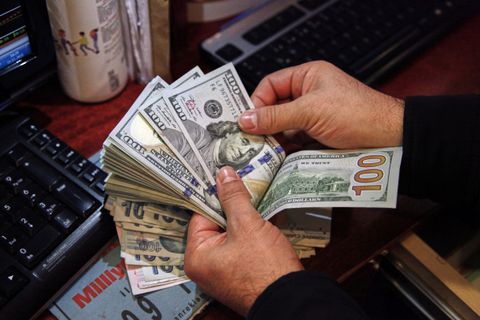The euro edged off five-year lows to rise back above $1.04 on Friday, but it is headed for a big weekly loss after Russia’s decision to restrict gas supplies to Europe renewed fears about an economic slowdown in the eurozone.
The single currency has been battered in recent weeks by a combination of fears for the economy suffering from the fallout of the war in Ukraine, and a huge rally in the dollar fuelled by bets the Federal Reserve will deliver a series of big interest rate hikes to tame inflation.
While investors expect the European Central Bank to lift rates out of negative territory this year, yields in the eurozone will lag the United States by a significant margin.
On Thursday, the euro dropped to as weak as $1.0354, its lowest since early 2017. It recovered to $1.0413 in early Friday trading but few analysts think the rebound is sustainable. The euro is down 1.3 per cent versus the dollar this week.
“In the very short-term, it’s difficult to see what is going to turn around the euro/dollar bearish trend,” said Lee Hardman, a currency analyst at MUFG. Hardman reckons the euro could fall below parity with the dollar within weeks or even days on the back of more bad news.
“Unless the Ukraine risks start to recede, it is going to be very difficult for the euro to move much higher.”
The dollar index fell 0.2 per cent to 104.54 but remained close to its two-decade high.
The rally in the dollar, aided by a flight-to-safety bid by investors concerned about inflation and economic uncertainty, has hit most major currencies. But the Japanese yen looked set to snap a nine-week losing streak.
The dollar regained a little ground on the Japanese currency and was last at 128.82 per dollar after hitting a two-week low of 127.5 overnight.
However, the dollar is still down 1.2 per cent against the yen this week, its first week of declines since early March.
“The yen is perhaps the most obvious signal of a shift from a world where yields were dominant and risk was resilient (yen negative), to a world this week where the dominant force is sour risk appetite driving yields lower (yen positive),” said Alan Ruskin, macro strategist at Deutsche Bank in a note.
Sterling rose marginally to $1.2217 after it was hit by data on Thursday showing Britain’s economy unexpectedly shrank in March. The Australian dollar rallied 0.6 per cent to $0.69 as risk appetite improved.
Crypto markets were steadier on Friday after a week of turmoil, as the risk-off mood combined with the spectacular collapse of stable coin TerraUSD.







Click here to change your cookie preferences